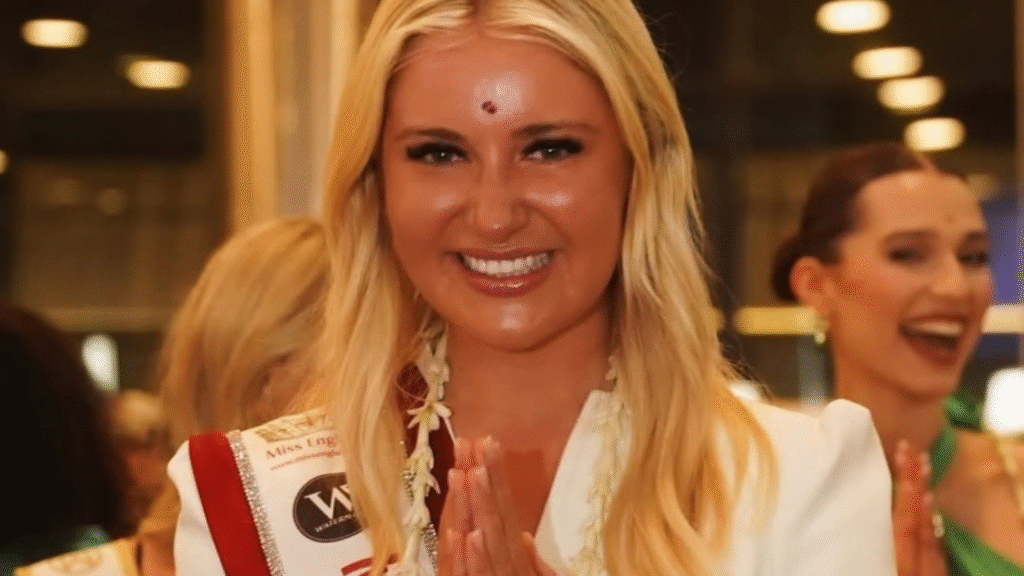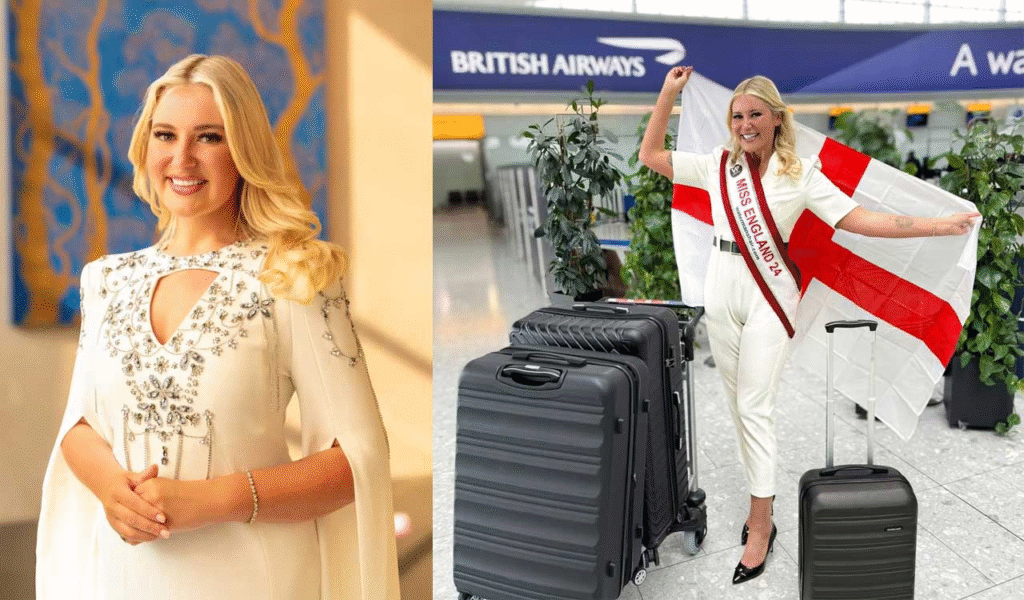
In an unexpected turn of events, Milla Magee, the reigning Miss England, has withdrawn from the prestigious Miss World 2025 pageant, sparking a whirlwind of controversy and speculation. The abrupt decision was announced earlier this week, sending shockwaves through the global beauty pageant community. Magee’s allegations of harassment during the competition have ignited a fierce debate about the treatment of contestants in such high-profile events.
The Allegations That Rocked the Pageant World
Magee, a 23-year-old law student and activist, took to social media to announce her decision, stating she felt “dehumanized” and likened the experience to being treated like a “prostitute.” Her post detailed incidents where she claimed to have been subjected to inappropriate remarks, undue pressure, and a lack of respect for her personal boundaries. While she refrained from naming individuals, her words painted a disturbing picture of the environment behind the glitz and glamour of the Miss World stage.
“I came into this competition hoping to inspire young women and make a difference in the world,” Magee’s statement read. “Instead, I found myself in situations that compromised my values and dignity.” Her candid revelations have led to widespread discussions on social media, with hashtags like #StandWithMilla and #MissWorldControversy trending globally.
A History of Controversy
This is not the first time beauty pageants have faced scrutiny over allegations of mistreatment and exploitation. For decades, critics have pointed out the darker side of these contests, ranging from unrealistic beauty standards to incidents of harassment and favoritism. Magee’s accusations have reignited these debates, with many questioning whether such competitions still hold relevance in today’s world.
Pageant organizers, however, have defended their practices, emphasizing the platforms they provide for women to showcase their talents, intelligence, and advocacy efforts. In response to Magee’s claims, the Miss World Organization released a statement expressing regret over her decision to withdraw and promising an internal investigation into the allegations. “We are committed to maintaining the highest standards of professionalism and respect for all participants,” the statement read.
Support and Backlash
Magee’s decision has drawn mixed reactions. While many have lauded her courage for speaking out, others have criticized her for tarnishing the reputation of the competition. Prominent figures from the beauty and entertainment industries have come forward to express their support, highlighting the importance of addressing systemic issues within such platforms.
British actress and activist Emma Watson took to Twitter to commend Magee’s bravery, stating, “Speaking truth to power is never easy. Milla Magee’s stand is a reminder that we must prioritize dignity over tradition.” Meanwhile, some fans of the pageant have accused Magee of seeking publicity, questioning the timing of her allegations.
Behind the Curtains: Insights from Former Contestants
Former pageant contestants have shared their own experiences in light of Magee’s revelations. Several individuals have come forward anonymously, recounting similar incidents of coercion, favoritism, and inappropriate behavior during international beauty competitions. One former Miss World finalist revealed, “There’s a lot that goes on behind the scenes that the public doesn’t see. Contestants are often treated as commodities rather than individuals with dreams and aspirations.”
These accounts have further fueled the ongoing discourse about the need for transparency and reform in beauty pageants. Critics argue that Magee’s story highlights systemic flaws that require immediate attention.
The Broader Implications
Magee’s decision to step away from the Miss World competition has broader implications for the beauty industry and the feminist movement. It underscores the ongoing struggle for women’s empowerment in spaces traditionally dominated by patriarchal norms. While pageants have evolved to emphasize advocacy and social impact, incidents like these raise questions about the sincerity of such efforts.
The controversy also points to the challenges of balancing tradition with progress. Beauty pageants, once considered a pinnacle of glamour and achievement, are now being re-evaluated through the lens of modern values and ethics. Magee’s case serves as a stark reminder of the work still needed to ensure that such platforms truly empower women rather than exploit them.
Moving Forward: Industry Reform and Accountability
As the Miss World Organization conducts its investigation, industry experts and activists are calling for tangible reforms. Suggestions include implementing stricter codes of conduct, providing mental health support for contestants, and establishing independent committees to address grievances. These measures, they argue, could help prevent future incidents and create a safer environment for participants.

Pageant historian Dr. Lydia McFarland notes, “This is a pivotal moment for the industry. If organizers fail to address these allegations meaningfully, they risk losing credibility and relevance in an era increasingly focused on ethical practices.” McFarland’s comments echo the sentiments of many who believe that change is not only necessary but overdue.
The Cultural Shift: Changing Perceptions of Beauty Pageants
Magee’s departure also signals a broader cultural shift in how beauty pageants are perceived. Once seen as platforms for celebrating beauty and talent, these competitions are now under greater scrutiny for their impact on participants’ mental health and societal standards. Critics argue that the emphasis on physical appearance often overshadows the achievements and aspirations of contestants.
In recent years, some pageants have made efforts to adapt to changing norms. The Miss World Organization, for instance, has introduced initiatives focusing on social impact and advocacy. However, incidents like Magee’s highlight the need for more substantial reforms to align with contemporary values.
Voices from the Industry
Several industry insiders have weighed in on the controversy, offering insights into the challenges faced by contestants. A former pageant coach, who wished to remain anonymous, described the intense pressure participants often endure. “From rigorous schedules to high expectations, the environment can be overwhelming. When you add issues like favoritism and harassment, it becomes even more challenging,” the coach explained.
Such revelations have prompted calls for greater support systems within the industry. Mental health professionals and advocates are urging organizers to prioritize the well-being of contestants by providing access to counseling and creating mechanisms for addressing grievances.
Public Reaction: A Divided Audience
The public’s response to Magee’s allegations has been divided. While many have rallied behind her, others remain skeptical of her claims. Social media platforms have become battlegrounds for debates, with users sharing their opinions on the controversy.
Supporters argue that Magee’s decision to speak out is a courageous act that sheds light on systemic issues within the industry. Critics, however, question her motivations, suggesting that her allegations may be an attempt to gain attention. Despite the differing viewpoints, the incident has undoubtedly sparked important conversations about the future of beauty pageants.
Lessons for Aspiring Contestants
For aspiring pageant contestants, Magee’s experience serves as both a cautionary tale and a call to action. It underscores the importance of advocating for one’s rights and values, even in challenging circumstances. Aspiring participants are encouraged to research thoroughly, seek mentorship, and prioritize their well-being when pursuing opportunities in the pageant world.
As one former contestant noted, “The glamour and recognition are appealing, but it’s crucial to understand the realities of the industry. Know your boundaries and don’t be afraid to speak up if something feels wrong.”
A Turning Point for the Industry
The controversy surrounding Magee’s withdrawal has placed a spotlight on the need for systemic change within the beauty industry. As discussions continue, stakeholders must work together to create a more inclusive and respectful environment for all participants. Magee’s story serves as a reminder that progress often begins with those brave enough to challenge the status quo.
Conclusion: A Catalyst for Change
Milla Magee’s decision to withdraw from the Miss World 2025 pageant has sparked a global conversation about the treatment of contestants and the broader implications for the beauty industry. Her allegations have highlighted the need for transparency, accountability, and reform within such platforms. While the controversy has cast a shadow over this year’s competition, it has also opened the door for meaningful change.
As the industry grapples with these challenges, Magee’s bravery in sharing her story will undoubtedly leave a lasting impact. Her actions remind us of the importance of prioritizing dignity, respect, and empowerment in all endeavors—a lesson that extends far beyond the world of beauty pageants.

